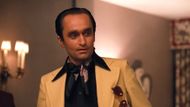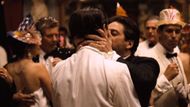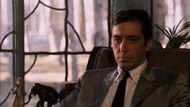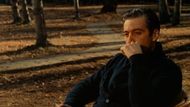There's film royalty, and then there's The Godfather. Since its release in 1972, it hasn't just impacted the gangster genre—it codified it. Francis Ford Coppola directed this adaptation of Mario Puzo's bestselling novel, but it's not simply a film about gangsters; it's a rich, operatic exploration of family, loyalty, power, and what the so-called American Dream is like when translated through blood and betrayal.
Set in 1945, The Godfather opens in the world of Don Vito Corleone—played with mythic gravitas by Marlon Brando—an old-school mafia leader struggling to uphold his dynasty as rival families close in and the world begins to change. It's less about gunfire and more about politics, legacy, and the emotional toll of running a criminal empire while trying to keep your own family in line.
The influence of The Godfather was so immense that it demanded a sequel. Thus, The Godfather Part II (1974) emerged, which not only continued the saga but also took it in bold, unexpected directions. The sequel interweaves two narratives: the coming of age of young Vito Corleone (Robert De Niro) and the chilling decline of Michael Corleone (Al Pacino), Vito's son and successor. This dual storytelling format pushed boundaries and won six Academy Awards, including Best Picture—nearly unprecedented for sequels.
At the heart of The Godfather Part II are the opposing brothers, Michael and Fredo. Michael, once the golden boy war hero, has become a cold, calculating mafia chief. This portrayal captures one of cinema's greatest character transformations—seeing a man who distanced himself from the family business become its embodiment of the worst impulses.
Fredo, heartbreakingly portrayed by John Cazale, is the middle brother who never belongs. Insecure and vulnerable, he tries to prove himself in a family that sees him as too soft. Caught between Sonny's flames and Michael's ice, Fredo is overlooked, underestimated, and yearning for recognition.
That desperation creates one of the most memorable moments in cinematic history: New Year's Eve in Havana. In a smoke-filled club vibrant with music and champagne, Michael embraces Fredo tightly, kisses him passionately, and delivers the famous line:
"I know it was you, Fredo. You broke my heart. You broke my heart!"
That moment—a kiss, a whisper, a death warrant—crashes like thunder. It combines betrayal and heartbreak into a visceral cinematic blow. More than a plot turn, it marks a turning point where the emotional cracks in the Corleone family lead to tragedy. Critics cite this as a masterpiece of performance, writing, and direction, showcasing how The Godfather intertwines power plays with personal sorrow like few movies do.
Let's explore the significance of Michael's kiss, examining what drove Fredo to betray him, the cultural implications of the infamous "kiss of death," and how that single moment influences the Corleone family and the enduring legacy of The Godfather.
Fredo's breaking point in The Godfather: A lifetime of being overlooked

Fredo Corleone was never seriously considered in The Godfather. While Sonny was the hothead and Michael the tactician, Fredo was the man others politely overlooked—the man more suited for nightlife than for negotiating mob transactions. And when Vito took a backseat, the family didn't even look to Fredo for leadership. They passed the baton directly to Michael, the youngest. That hurt never dissipated—it spread.
As Screen Rant states:
"Fredo’s decision to betray Michael is rooted in his feelings of inadequacy compared to his brother, his father, and his powerful family more broadly. Although Fredo’s incompetence is instrumental in his downfall, it is his desire to succeed outside the mafia that dooms him."
His desperation made him an ideal target for Hyman Roth and Johnny Ola, who played on his ego by dangling influence. Fredo thought he was finally getting his chance at being big and provided them information on Michael's operations, unaware this would lead to an attempt on his brother's life.
Later, he attempts to justify:
"I didn’t know it was going to be a hit, Mike!"
But in the world of the Corleone, betrayal requires no intent. The deed is done. And Fredo had passed a boundary that he could not return from.
The Havana kiss: Intimate, icy, final

The moment when Michael kisses Fredo on New Year's Eve in Havana is a cinematic legend. Amidst a throng of revelers celebrating the arrival of a new year, Michael leans in and plants a kiss on Fredo's lips. It is gentle, quiet, and utterly shattering.
In mafia culture, that’s the “kiss of death.” It’s not just emotional—it’s practical. It’s a sign: you’re marked.
As StudioBinder points out,
"By giving Fredo the “kiss of death,” Michael all but seals Fredo’s fate as a marked man; which is especially tragic considering Fredo was once Michael’s biggest supporter."
The betrayal came not from an outsider but from his own brother, who now sentences him with a whisper and a kiss. The kiss parallels Judas betraying Jesus, but Michael flips the script: he’s the betrayed and the one kissing. It's not punishment; it’s grief.
This juxtaposition—public jubilation vs. private destruction—makes it unforgettable. Fredo's face reveals fear, humiliation, and heartbreak; he knows what's coming.
The mafia rulebook has no exceptions

In the Corleone universe, one principle supersedes all else: loyalty to family. Betray it, and it doesn't matter who you are—you're out. Forever.
From chat rooms to movie critics, there's a consensus: Michael had no choice. Sparing Fredo would have been seen as weakness. Carlo, Tessio, Paulie—they were all killed for less. Allowing Fredo to live would send the wrong message: that familial bonds forgive treachery. And in this world, thinking like that gets you whacked.
A Redditor said it straight out:
"To me, Fredo was dead since the kiss in Cuba. He betrayed Michael, which is to betray the Coroleone organization. He had to die. And Michael had to kill him."
But this wasn't business. For Michael, it was personal torture. He wasn't angry—he was devastated. The kiss was his lament for the brother he had already lost. He understood what needed to be done, and that's why it hurt more.
The fallout: Michael wins, but loses everything

Murdering Fredo didn't resolve Michael's problems; it hollowed him out. At the end of The Godfather Part II, he's not triumphant—he's empty. Alone in his lakefront estate, surrounded by nothingness, Michael is a man who has lost everything that mattered to him in the name of family, even his family.
Those last scenes—Michael alone, with flashbacks of better times with Vito and his brothers—aren't just nostalgic. They're a gut punch. We see exactly what he sacrificed and what he's left with.
The Godfather Part III takes place several years later, and Fredo's specter still haunts Michael. His conscience is always present. He's an older man, tired, trying to come to terms with the life he's built and the men he buried.
One reading puts it succinctly:
"And there’s evidence in the third movie that the killing of Fredo had ongoing emotional repercussions on Michael."
It wasn't a hit. It was the one thing that made him—and broke him.
That Havana kiss didn't just condemn Fredo. It condemned Michael as well.
Love movies? Try our Box Office Game and Movie Grid Game to test your film knowledge and have some fun!
